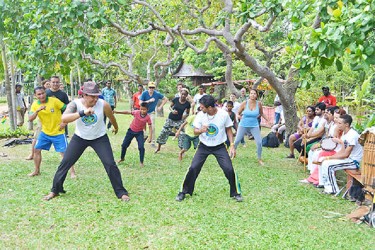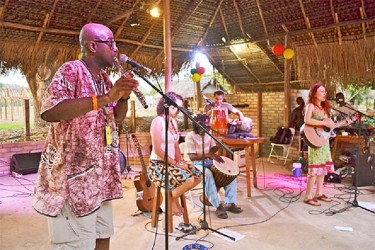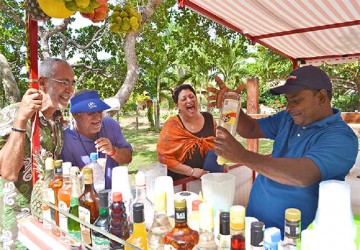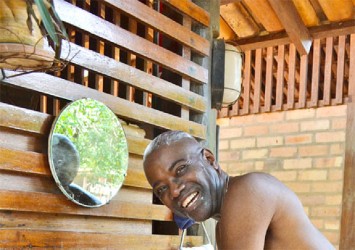He shaved his head, shirtless while chatting with the cook. In the open, glancing into a little round mirror at the side of the kitchen, purple soap at hand, the award-winning flautist Keith Waithe was (figuratively speaking because he has little to speak of), letting his hair down to giggles from the cooks.
It was that kind of festival.
What happens in Rock View really should stay in Rock View but how many times does one get to laugh, dance, sing, and act a little bit crazy in the grass under the burning stars of the Rupununi skies while flickering shadows reveal people in costume, the next act in the celebration that was the Rupununi Music and Arts festival.
It was music and more. Music plus if you may. New, sure; eclectic, certainly; fun, definitely. Where else would you stumble upon THE Keith Waithe shaving his head, shirtless in front of a mirror while chatting with the cook? Or sit at breakfast with Aref Durvesh the tabla artiste from the UK while he straight-facedly asked a volunteer whether it was his tai-chi skills or screams that scared away a would-be robber in Georgetown? Or chat under a five-finger tree with Ukrainian singer Iryna MuHa, she of the strange music but magical, melancholic voice that makes you wonder what sad tale lies hidden in the undecipherable lyrics? Or picture the scene as the decidedly cool silvered-haired owner of the Rock View Lodge Colin Edwards vividly tells of falling asleep on the grass “with a smile on my face.”

For Valentine’s weekend in Annai at least, everyone was a Rupununi-holic as Edwards and friends’ ‘crazy’ scheme conceived in London roared to life at the Rock View Lodge at Annai, North Rupununi. It was a challenge, the ever-energetic 66-year-old man acknowledged while recalling being told that he was “certifiably mad” to even think of bring such a festival to the Rupununi. But he said, “Crazy people have crazy ideas… crazy people make the changes in the world that others wouldn’t do.”
It was a genius, gambling kind of crazy – the kind that takes a while to take off. Some potential sponsors shied away, the Georgetown-Lethem road is currently like a bumpy honeycomb particularly the stretch from Linden to Mabura and thus a limited number of people from “outside” showed. The car park was virtually empty with most of the persons from outside the region coming via aircraft. “We got the maximum amount of airlift we could get but that’s not many people,” Edwards said.
He acknowledged that there were hiccups and said that it would probably take about three years for the festival to be self-sustaining. The investment in infrastructure should have been more and there could have been better marketing tools, he said while pointing out that there were also doubts in people’s minds about whether the festival could happen. But, in the end, the impossible proved possible.

The camping, outdoor music festival was a first for the Rupununi and Guyana and Edwards insisted that it will continue. “This should be a lot easier next year for many reasons,” he said. “We have gone over the hump… I think they’ve backed a good horse.”
There is an exhilarating feeling about experiencing something for the first time and the festival was certainly different. It was not about earsplitting music boxes and DJs shouting or VIP sections (if you wanted to go to the front, you went to the front).
It was about the music, the experience, the atmosphere and the sense of adventure, it was about appreciation of a diverse range of music from around the world (except jazz of which I am no fan; may all the jazz gods and artistes at the festival forgive me).
It was about immersing oneself in the Amerindian culture of the area, grooving to Bob Marley and Jah Cure as interpreted by Fineman and rocking the night away under the silvery moon to the American rock band, Filligar. It was about grabbing that moment to leap on stage at the Badger’s Den as Natasha did, rocking with the band with a shak-shak. Or forro with the Macushi Band at the Henge. Or jazz at the poolside. Or jumping into the spirit of the Brazilians who never-tiring, spread their infectious fun from morning until late at night with everything from jokes to capoeira (not forgetting the cocktails Brazilian style).
The art was limited but rich: sculptures by George Simon and Phillip Moore, paintings by Simon and others along with Amerindian craft such as elaborate blowpipes.
But there was more than music and art. Annai is perched on the edge of the savannah on the fringes of the rainforest and there were hills and mountains to climb, feeling the cool breeze in your hair as mist covered the nearby mountains. There was the rock garden to explore and a pool to take a dip in. Touring Rock View itself revealed new details as picking a fruit or two, Edwards’s agro-tourism initiative is unveiled. There were opportunities to watch the cows being fed, horses and foals prancing around their paddocks.

There were opportunities to be the fly on the wall and learn a bit more about different lives like the drum minister and the history of the Rupununi. “This is hot water, lemon grass, well there should be coffee and milk somewhere,” said Edwards for about the tenth time as he greeted performers and visitors one morning. And for him, there’s nothing quite like carila tea. As for the numerous purple fruit jamoon: “We got too much jamoon but they make wonderful wine.”

Listening to poems, watching indigenous dances, swaying to the rhythms, meeting new people, tasting new food (although there were few indigenous food and drinks), and learning all in one weekend as the world came to the Rupununi’s doorstep.
The Rupununi is a different land, the festival a chance to get away from the hustle and bustle of life and to just relax (unless you’re a working journalist with a lousy data connection from the cellular service provider in the area).
At Annai, for Valentine’s weekend it was music, nature, friendship and fun. The tassa and African drums went thump, thump, thump from morning till night; the Amerindian culture groups in song, told of drinking parakari and piwari and inviting all to come celebrate. Guitars strummed, shak-shaks shook, trumpets blew, singers sang, rockers rocked and Keith Waithe, well, away from the kitchen sink, he did what he does best. It was more than music in the savannah. It was better.





